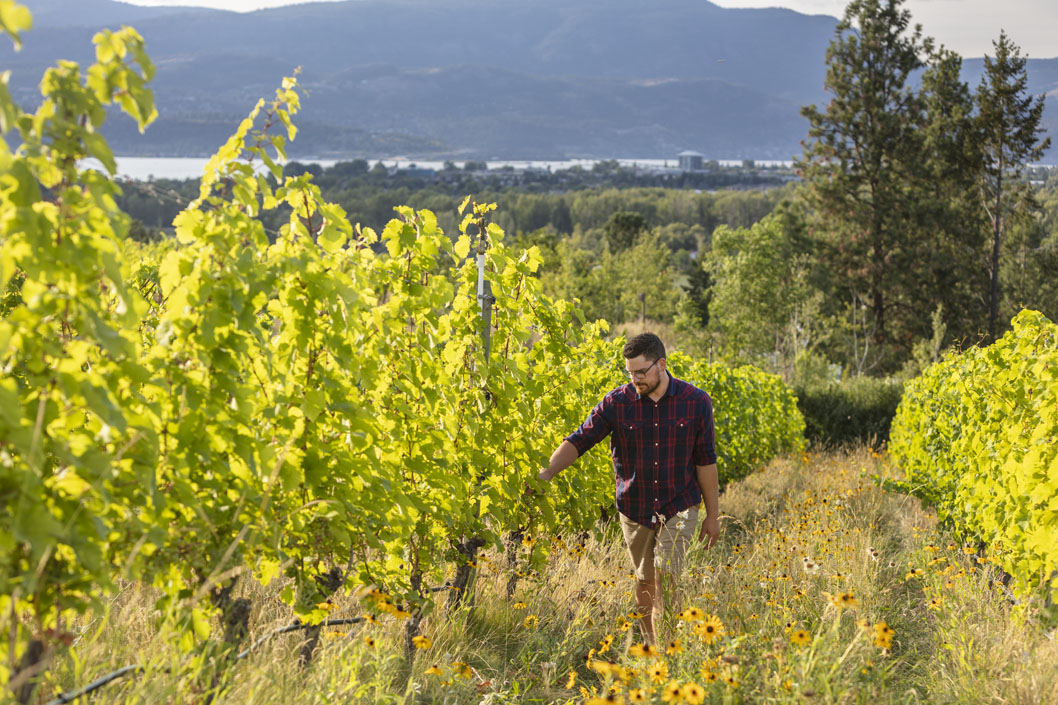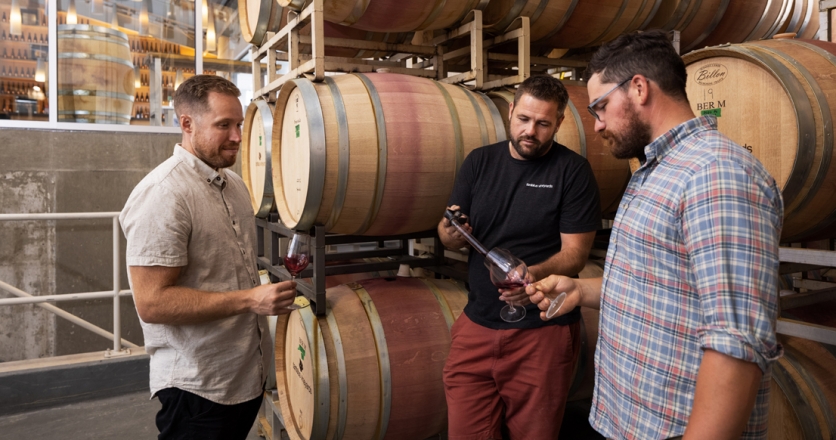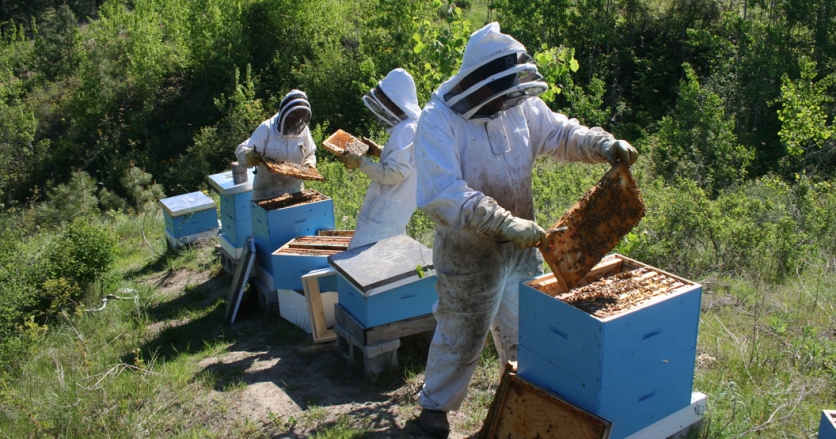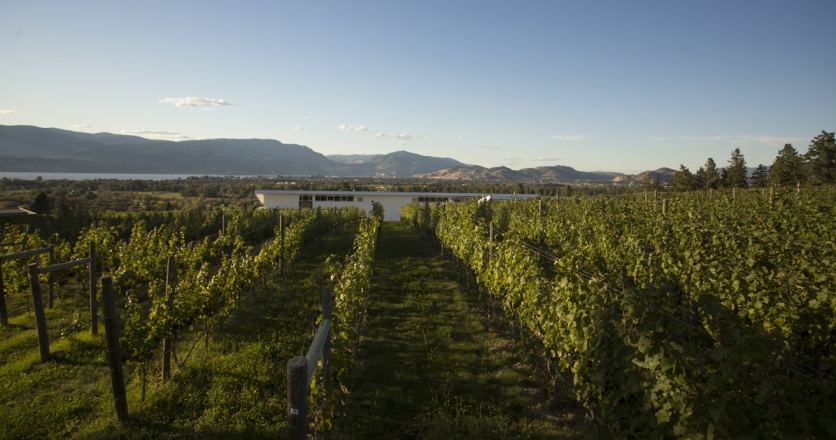Certifiably Sustainable
It’s unlikely that anyone who grows, makes or drinks wine in the Okanagan Valley will forget the 2021 vintage.
In June, an unprecedented heat dome covered the entire Pacific Northwest, sending temperatures soaring high into the 40s C and shattering records across British Columbia. With the dry heat came thousands of wildfires. The pall of smoke lingered into fall, when epic rainstorms arrived and shattered every major highway. Harvest was early. Berries were small. Yields were down by as much as 30 per cent, so even though quality is expected to be high, there will be little wine to enjoy.
As Corrie Krehbiel, winemaker for Mission Hill Family Estate Winery, noted in the B.C. Wine Growers 2021 Vintage Report, “The 2021 growing season was one of the most challenging in our 40-year history of winemaking in the Okanagan Valley.”
The Okanagan wasn’t alone. It was the hottest year on record for pretty much every other wine region in the world, too. The climate crisis is suddenly all too real.
None of this comes as a surprise to Pancho Campo, the Chilean tennis star turned sustainable wine evangelist, who was in the Okanagan Valley in April to film a documentary about the region. “Climate change is the most pressing issue our society is facing. [It] is threatening all of us. And we are not doing things right,” Campo said at a press event for Green Wine Futures, the conference he founded for global wine community. “It’s our responsibility. We cannot wait for politicians or multinationals to solve our problems.”
Globally, winemakers and growers have been among the first to respond to the crisis, he says. And it’s why he was in the Okanagan, where, for many wineries, sustainability is simply a way of life, whether it means organic farming, supporting biodiversity, reducing carbon footprint or simply helping each other thrive.
Wineries lead the way
In 1986, when the Cipes family bought the East Kelowna property that is now Summerhill Pyramid Winery, they immediately started planting according to organic principles, which include avoiding toxic pesticides, herbicides or synthetic fertilizers. Back then, B.C. barely even had a wine industry, let alone an organic one. Today, some 20 per cent of the Okanagan Valley’s 8,800 acres of vineyard land either is or shortly will be certified organic. The rest of the world’s wine regions average about 3.6 per cent.
All that organically farmed land includes all seven of Anthony von Mandl’s Iconic Wineries of British Columbia. With more than 1,000 acres of vines, he is the biggest vineyard landowner in the province, and his commitment to sustainability has almost certainly encouraged others to follow suit. As Mike Overend, the destination stewardship manager for the Thompson Okanagan Tourism Association (TOTA), says, “If a couple of wineries are doing it, others are like, ‘What are they doing over there?’ It’s putting pressure on them to step up their game.”
Even where wineries haven’t sought certification, many are finding other ways, big and small, to be more sustainable.
For instance, shipping heavy bottles is a vast use of energy resources, so tiny Birch Block Vineyard in Kaleden chose to package its 2021 rosé in lightweight cans to lessen its carbon footprint. Co-owner Sarah Bancroft notes that each pallet of cans “takes up one-third of the room that bottles would have, wastes less cardboard and is lighter to ship.”
Orofino Vineyards in the neighbouring Similkameen Valley uses straw to insulate the barrel room, keeping temperatures evenly cool with little energy use. Meanwhile, Tightrope Winery on the Naramata Bench eliminated the use of insecticides by planting flowering cover crops to encourage predatory insects. LaStella Winery near Osoyoos composts its vineyard with organic waste from the winemaking process, creating a closed loop of sustainability.
And in East Kelowna, Tantalus Vineyards is not just committed to regenerative farming and protecting biodiversity, in 2010 it became B.C.’s first winery to earn the Leadership in Energy & Environmental Design certification. It was recognized for everything from its wastewater treatment system and use of natural light to its partnership with nearby Arlo’s Honey Farm, which protects pollinators and keeps orchards and vines buzzing with health.
Tantalus is also a founding member of Sustainable Winegrowing B.C. and was among the first wineries to be certified by the organization in 2021. The B.C. wine industry’s new sustain- ability program is widely recognized as the most rigorous and transparent of its kind in the world.
As Overend says, “Our wineries have been doing some amazing things.”
‘A journey of sustainability’
Organic farming, pollinator preserving, wastewater managing and other initiatives were already happening at Okanagan wineries in 2012 when TOTA started on what president and CEO Ellen Walker-Matthews calls “a journey of sustainability.”
Since the 1960s, TOTA had been a membership-based organization of 200 to 300 businesses. They eliminated the membership fee, formed a partnership with Destination B.C. and welcomed any business that wanted to join them. They quickly grew to more than 3,500 stakeholders and started working on a destination development strategy.
Job one was to survey local businesses and they were surprised by what they heard. “Everyone had the same message,” Overend says. “We don’t want tourism just for the sake of tourism. We want it to be sustainable. We don’t want people coming here ruining our assets.”
After researching the options available to them, TOTA connected with the Responsible Tourism Institute (RTI), which offers a certification based on the 17 sustainable development goals of the United Nations 2030 Agenda. They include social and cultural goals, such as zero hunger and gender equality, as well as environment ones such as clean water, clean energy and urgent action to combat climate change.
In November 2017, the Thompson Okanagan region, including its nearly 200 wineries, met the RTI’s 137 benchmarks to qualify as the first place in the Americas to earn the prestigious Biosphere Destination certification. It is one of only 50 Biosphere Destinations worldwide, most of them in Europe. Now the rest of B.C. is in the process of becoming certified too.
The move transformed TOTA from a marketing organization into a sustainability one.
“I don’t think there’s a single stakeholder we’ve talked to who doesn’t want to become more sustainable. It comes down to not enough money, not enough time,” Overend says. So TOTA works with a local company that will, on request, do an energy, water and waste audit of a business, and offer suggestions for how to improve and where to find rebates. TOTA will even help write grant applications.
So far, upwards of 50 businesses have taken advantage of the audits. “It’s really grassroots,” Overend says. “If we could get, over the next 10 years, 500 companies to change their ways, that would really make a positive impact on the environment.”
He adds: “The idea is to get stakeholders to buy in and they really have. And a lot of the wineries have been doing a lot of these things long before we started.”
The climate crisis
As he travelled through the Okanagan Valley, Campo was impressed by the region’s commitment to sustainability. “What really caught my attention is that everybody is so concerned about the environment,” he says.
But composting plant waste and building bird boxes is one thing. The climate crisis is a whole other beast.
Campo has been talking about wine and climate change since even before he wrote his dissertation to become Spain’s first Master of Wine back in 2008. In 2006, he organized the first World Conference on Climate Change and Wine, which was attended by just a handful of delegates; this year’s Green Wine Futures, held virtually from May 23 to 26, featured 126 speakers with an expected global audience of 150,000.
“The main characteristic of climate change, especially in the wine industry, is climate uncertainty,” he says. “There is drought when there shouldn’t be; there is rain when there shouldn’t be.”
He adds: “In some places it’s beneficial because grapes can harvest properly.” Grapes that once struggled to ripen can now do so consistently. B.C. Syrah is a good example. A decade ago, Syrah was a marginal grape in the Okanagan, vulnerable to the cold winters. Now it is one of our signature varieties.
Meanwhile, regions such as Champagne are becoming too hot for the grapes that once thrived there. In others, rain falls when it’s least expected or wanted, bringing with it disease, rot and flooding. Frost kills new growth at bud break. Late-summer hail demolishes an entire harvest. Pests and fungal diseases thrive in the heat. Grapes burn on the vine under the harsh sun. And then, of course, there is the ever-present risk of fire.
Worst of all, the heat is not great for the wine, either, producing too much sugar and alcohol, and not enough phenolic ripeness. In other words, climate change will reap a bitter harvest.
But the news isn’t all bad, Campo insists: “We still have tools, we still have time to fight the climate crisis.”
Wine producers can mitigate a changing climate by reducing energy consumption, for instance, by replacing gas-powered vehicles with electric ones. They can also adapt to it by selecting resistant rootstocks and heat-loving varieties, or planting in cooler altitudes or higher elevations. “You can always go south in southern hemispheres and north in the northern hemisphere,” Campo says. “But these are temporary measures. You have to practise mitigation at the same time as adaptation.”
In the Okanagan Valley, winemakers and growers are already working on a more sustainable future, and have been for decades. As Overend says, “We’ve always been Super Natural British Columbia. Now we’re walking the walk.”







